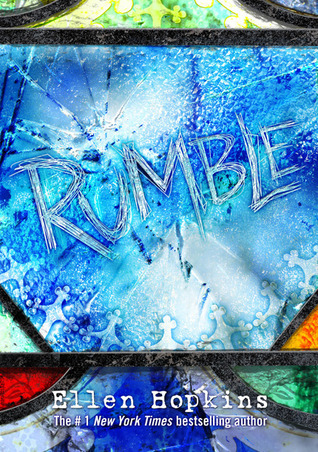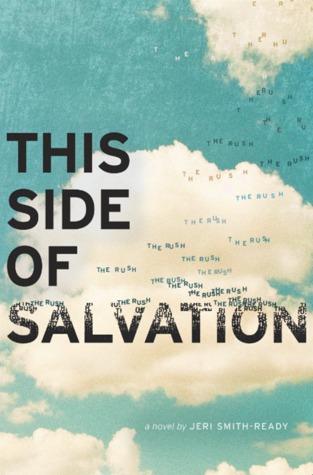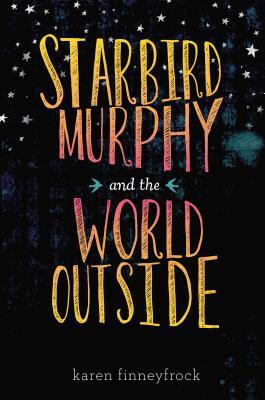With Hanukkah and Christmas at hand, this seems an inopportune time to review books about teens who question the religious beliefs of their elders. Still, adolescence is a time of questioning, and whatever decision a young person makes about faith and religious practice will be stronger for the experience of having thought through all sides. In my seventh grade Sunday school class, my co-teacher and I encourage students to ask questions, argue, and learn more. Sometimes they are shocked to hear that they can choose what to believe, and discussing their ideas with each other serves as a bonding experience as well as a way to develop a personal theology.
Three recent books for teens—Ellen Hopkins’s Rumble (Simon & Schuster, 2014), Jeri Smith-Ready’s This Side of Salvation (Simon & Schuster, 2014), and Karen Finneyfrock’s Starbird Murphy and the World Outside (Viking, 2014)—portray characters who are part of a religious community. In the first two, it is a fundamentalist Christian church, while Starbird is part of a nature-centered utopian community.
 In Rumble, Matthew has already lost his faith, and his passionate essay questioning the existence of God attracts the attention of school authorities. Complicating his situation is the fact that his father teaches in the district and is the varsity basketball coach—and his younger brother, Luke, a gifted basketball player, committed suicide the previous year. Luke was gay, and their father refused to have him on the team, or to intervene in any way when Luke suffered relentless bullying. Like his father, Matthew’s girlfriend is a fundamentalist Christian who condemns homosexuality, but even though they say, “hate the sin but love the sinner,” they rejected Luke without his ever having had sex. After struggling with his feelings for his girlfriend versus his guilt for not having helped Luke more, Matthew sees the cruelty practiced by the Christians in his life. How can a merciful God allow such cruelty to happen?
In Rumble, Matthew has already lost his faith, and his passionate essay questioning the existence of God attracts the attention of school authorities. Complicating his situation is the fact that his father teaches in the district and is the varsity basketball coach—and his younger brother, Luke, a gifted basketball player, committed suicide the previous year. Luke was gay, and their father refused to have him on the team, or to intervene in any way when Luke suffered relentless bullying. Like his father, Matthew’s girlfriend is a fundamentalist Christian who condemns homosexuality, but even though they say, “hate the sin but love the sinner,” they rejected Luke without his ever having had sex. After struggling with his feelings for his girlfriend versus his guilt for not having helped Luke more, Matthew sees the cruelty practiced by the Christians in his life. How can a merciful God allow such cruelty to happen?
Like others of Hopkins’s best-selling novels-in-verse, Rumble addresses controversial issues head-on and captures Matthew’s emotions in a way that connects with young people in similar situations. There isn’t a lot of subtlety here, and those looking for the hypocrisy of the “devout” will find plenty of that in Matthew’s father, his girlfriend, and the youth minister at his girlfriend’s church. In the end, though, this is a passionate novel that will lead readers to ask themselves if Matthew can have it both ways—to believe in a merciful God and to know of the brutal acts other humans have perpetrated in His name.
This Side of Salvation offers a more nuanced portrait of a fundamentalist Christian church, one in which the young people have already taken a stand in favor of inclusion and acceptance of peers who are different. David’s family used to be mainline Episcopalians until the death of his older brother in Afghanistan. Afterwards, David vandalized a fundamentalist church, but in making restitution he became attracted to the strong religious community and drew his parents in. Yet while he has become a leader in the youth group (as well as a loyal ally to his gay friend), his parents, especially his recovering alcoholic father, have fallen under the sway of a breakaway minister who believes the world is coming to an end. When David rescues his older sister from a drinking party busted by police, the two return to an empty house and their parents missing. David fears the worst—that because the world hasn’t come to an end, his parents committed suicide.
Smith-Ready’s novel has the forward momentum of a good mystery, with David’s search for his parents alternating with flashbacks detailing how the family got to this point. Throughout, David grapples with issues of faith and dogma, seeking a middle ground between nonbelief and the kind of absolute obedience to a religious leader that his father has embraced.
 Less traditional is the religious community portrayed in Starbird Murphy and the World Outside. Starbird lives on a farm in Washington State owned by the Free Family, a commune that has been in existence for more than 40 years. Its leader calls himself EARTH and says he is the interpreter of the Cosmos, but for the past three years, EARTH has gone incommunicado, and the members of the commune, its two satellite communes, and a natural foods café in Seattle have had to make decisions for themselves, guessing at what EARTH would want. Starbird’s Calling, it seems, is to move to Seattle, work at the café, and attend a public school for the first time in her life. On the Outside, she meets a boy whose parents are fundamentalist Christians, and little by little begins to question her own set of beliefs.
Less traditional is the religious community portrayed in Starbird Murphy and the World Outside. Starbird lives on a farm in Washington State owned by the Free Family, a commune that has been in existence for more than 40 years. Its leader calls himself EARTH and says he is the interpreter of the Cosmos, but for the past three years, EARTH has gone incommunicado, and the members of the commune, its two satellite communes, and a natural foods café in Seattle have had to make decisions for themselves, guessing at what EARTH would want. Starbird’s Calling, it seems, is to move to Seattle, work at the café, and attend a public school for the first time in her life. On the Outside, she meets a boy whose parents are fundamentalist Christians, and little by little begins to question her own set of beliefs.
Like David and Matthew, Starbird is a bright, likeable teenager who wants to do the right thing for herself and for the people she loves. She has always believed in the Free Family’s worship of nature, its egalitarianism, its strong communal bonds, and its belief that a utopian society is possible. But from the Outsiders and former Free Family members, she comes to see the dark side—property gained through the coercion of well-meaning members, the authoritarianism of EARTH, a refusal to provide adequate medical care for pregnant or sick community members, and allegations of corruption. Starbird wants to live in a world where people love and care for each other—the world she had on the farm—but is it possible without EARTH? Or with him?
Taken together, these three books offer opportunities for young readers to delve into issues of faith, religious practice, and ethics. The holiday season—a time of celebration, reflection, and family and community togetherness—is as good a time as any to think about what we believe and how we want to live.
1 comment for “Three Books on Questioning Religious Belief”